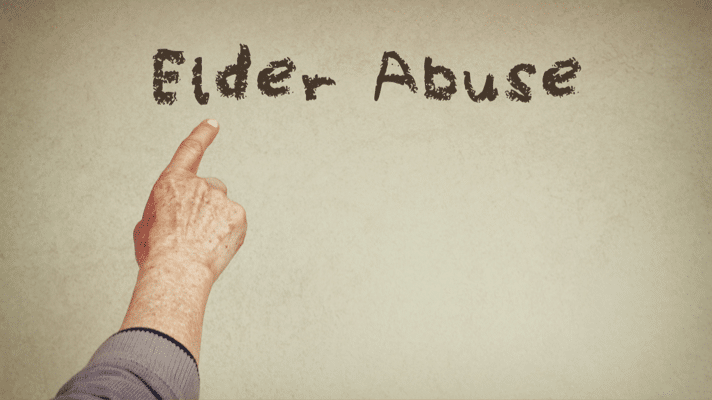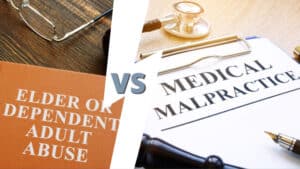Written By: Chris Dolan and Anna Pantsulaya
Elder abuse, a disturbing and often hidden societal issue, has garnered increasing attention in recent years due to its profound impact on vulnerable individuals. In California, approximately 225,000 cases of elder abuse occur every year. Sadly, experts estimate that for every case of elder abuse and neglect that is reported, there may be as many as five cases that go unreported. This troubling phenomenon violates fundamental human rights and undermines the dignity and well-being of seniors, who deserve respect and protection in their later years. As populations age worldwide, addressing elder abuse becomes not just a moral imperative but a critical aspect of social welfare and justice. This introduction sets the stage for exploring the multifaceted dimensions of elder abuse and its profound significance in contemporary society. The purpose of this article is to provide a guide on recognizing and reporting elder abuse in California.
Understanding Elder Abuse
California enacted the Elder Abuse and Dependent Adult Civil Protection Act (EADACPA) to address a variety of concerns about the care of older adults. Civil law defines Elder Abuse as physical abuse, neglect, financial abuse, abandonment, isolation, abduction, or other treatment resulting in harm, pain, or mental suffering to an elder (someone 65 years or older). It also means the deprivation by a care custodian of goods or services that are necessary to avoid physical harm or mental suffering. (Welfare & Institutions Code Section 15610.) Elder Abuse encompasses a range of mistreatment types: physical, emotional, sexual, financial exploitation, and neglect.
Awareness and timely intervention are crucial in combating elder abuse, as they can significantly mitigate its devastating effects on older adults. By raising awareness among communities, caregivers, and healthcare professionals, we can empower individuals to recognize the signs of abuse and take proactive steps to protect vulnerable seniors. Timely intervention plays a pivotal role in halting ongoing abuse, preventing further harm, and providing victims with the support they need. It enables authorities and support services to investigate cases swiftly, offer assistance, and hold perpetrators accountable. Moreover, proactive measures such as education programs and public campaigns educate the public and foster a culture of respect and vigilance toward elderly rights. Ultimately, prioritizing awareness and timely intervention is essential in safeguarding the well-being and dignity of our aging population.
Recognizing Signs of Elder Abuse
Recognizing signs of elder abuse is crucial for identifying and addressing mistreatment towards older adults, who are often vulnerable and may experience various forms of harm. Identifying these signs requires a nuanced understanding of behavioral cues, physical indicators, and changes in a senior’s demeanor or living conditions. Educating caregivers, family members, and healthcare professionals about these signs can empower them to intervene effectively and support victims.
Some key things to look for include:
- Physical Abuse: bruises, cuts, broken bones, and unexplained injuries.
- Emotional Abuse: withdrawal, depression, anxiety, and fearfulness.
- Financial Abuse: sudden changes in financial situation, missing belongings, and unauthorized transactions.
- Sexual Abuse: unexplained STDs, injuries in genital areas, and sudden changes in behavior.
- Neglect: poor hygiene, malnutrition, untreated medical conditions, and unsafe living conditions.
Risk Factors for Elder Abuse
Elder abuse can stem from a complex interplay of factors, and understanding these risk factors is crucial for early identification and prevention efforts. Social isolation ranks among the foremost risks, as seniors who lack regular social interactions may become more vulnerable to exploitation and neglect, with fewer opportunities for others to notice signs of abuse. Caregiver stress is another significant factor; overwhelmed caregivers, whether family members or professionals, may experience burnout, leading to neglect or mistreatment of the elderly under their care. Additionally, cognitive impairments such as dementia can impair judgment and increase susceptibility to manipulation or abuse by others.
Recognizing these risk factors enables caregivers, healthcare providers, and community members to intervene proactively. Regular assessments of an elder’s social connections can help identify those at risk of isolation, prompting initiatives to enhance social engagement and support networks. Training caregivers to manage stress effectively and providing respite care can mitigate the strain that often precipitates abuse. Moreover, understanding how cognitive impairments impact behavior allows for tailored interventions that safeguard vulnerable seniors and address their unique needs. By addressing these underlying risk factors, communities can create environments that promote elder well-being and reduce the incidence of abuse, fostering a safer and more supportive environment for older adults.
Where to Report Elder Abuse in California
If you suspect that the elder is in immediate danger or requires emergency assistance, it is imperative to contact 911 immediately. Additionally, two state protective services are available depending on where the abuse occurred.
If the abuse occurred as an inpatient in an acute care hospital, in a private residence, hotel, apartment, shelter, or location not otherwise listed, contact the local Adult Protective Services agency in the county where the patient lives. Each county in California has its own APS agency. To find the contact information for the local APS, you can visit the California Department of Social Services website or call the Eldercare Locator at 1-800-677-1116.
If the abuse occurred in a nursing home, adult residential facility, adult day program, or day health care center, contact the local Long-Term Care Ombudsman Program where the abuse occurred or the Long-Term Care Ombudsman CRISIS line at 1-800-231-4024.
What Information to Include in a Report
Gathering evidence when suspected elder abuse occurs is critical for several reasons.
- Firstly, it provides substantiation of the abuse allegations, which is essential for initiating investigations and legal proceedings. Clear evidence, such as photographs of injuries, financial records showing unauthorized transactions, or eyewitness accounts, strengthens the case and supports the victim’s credibility.
- Secondly, evidence helps identify patterns of abuse and assess the severity of the situation, which assists in guiding appropriate interventions to ensure the safety and well-being of the elder. Moreover, documented evidence can aid in holding perpetrators accountable and seeking justice for the victim.
- Finally, gathering evidence facilitates collaboration among agencies, such as Adult Protective Services and law enforcement, enabling a coordinated response to protect vulnerable seniors from further harm. Ultimately, documenting evidence of suspected elder abuse is crucial for effective intervention, safeguarding elderly individuals from mistreatment, and ensuring that appropriate support and legal measures are implemented.
Be prepared to provide as much information as possible, including:
- Name, age, and address of the elder.
- Nature of the abuse (e.g., physical abuse, neglect).
- Details about the alleged abuser, if known.
- Any evidence or documentation (e.g., photos of injuries, financial records).
There are two State forms:
- Required: Form SOC-341 – This is a one page form to which you can attach other pages as needed (such as a body map).
- Optional detailed forensic form: Form CalEMA 2-602 – This is a 10-page forensic examination form with instructions.
Legal Protections for Reporters
California Welfare and Institutions Code § 15630 defines a “mandated” reporter for elder/dependent adult abuse as anyone who:
“has assumed full or intermittent responsibility for care or custody of an elder or dependent adult, whether or not that person receives compensation, including administrators, supervisors, and any licensed staff of a public or private facility that provides care or services for elder or dependent adults, or any elder or dependent adult care custodian, health practitioner, clergy member, or employee of a county adult protective services agency or a local law enforcement agency.”
California Welfare and Institutions Code § 15630
A “care custodian” is an administrator or an employee of a public or private facility who provides care for elders and dependent adults as part of his or her official duties, including support and maintenance staff. Therefore, all health practitioners and all employees in a long-term healthcare facility are mandated reporters.
Mandated reporters are required to identify themselves on written reports. Their identity can remain confidential. If you are not a mandated reporter, you can choose to report elder abuse anonymously.
Even if you are not a mandated reporter, it is helpful to give your contact information to Adult Protective Services (APS) or your local law enforcement agency so they can follow up and make sure they have all relevant information.
Supporting the Elderly Post-Report
Supporting the elderly after reporting elder abuse is vital to helping them recover and regain a sense of safety and well-being. Once abuse is reported and investigated, it’s important to offer emotional support and reassurance to the elder. Supporting them may involve listening to their concerns, validating their experiences, and providing comfort during a distressing time. Encouraging them to seek medical attention or counseling can address any physical or emotional trauma they may have experienced. Practical support, such as helping them secure their finances, find alternative living arrangements if necessary, or connect with community resources like support groups or legal aid, can also be crucial. Providing ongoing follow-up and monitoring ensures that the elderly continue to receive the assistance they need to rebuild their lives free from abuse. By offering compassionate support and practical help, we can empower elderly individuals to recover from abuse and regain their dignity and autonomy.
Recognizing and addressing elder abuse in California is not just a moral obligation but a critical step in safeguarding the well-being and dignity of our elderly population. The prevalence of elder abuse, with an estimated 225,000 cases reported annually in the state, underscores the urgent need for awareness, timely intervention, and effective reporting mechanisms. Understanding the signs and risk factors associated with elder abuse enables caregivers, healthcare professionals, and communities to intervene proactively, offering vital support and protection to vulnerable seniors. By documenting evidence, reporting suspicions promptly to Local Law Enforcement, Adult Protective Services, or the Long-Term Care Ombudsman Program, and providing compassionate support to victims, we can ensure that elderly individuals receive the care and justice they deserve. Together, we can work towards creating a safer and more respectful environment for older adults, where they can live free from abuse and with dignity in their later years.
If you or someone you know suspects elder abuse or needs assistance navigating legal complexities related to this issue, it’s crucial to seek professional guidance promptly. Legal experts specializing in elder law can provide invaluable support, offering insights into protective measures, reporting protocols, and avenues for seeking justice. Whether you’re concerned about financial exploitation, neglect, or any form of mistreatment, reaching out for a consultation with an experienced attorney can help ensure that the rights and well-being of older adults are upheld. Do not hesitate to seek legal advice to address elder abuse effectively and advocate for those who may be in vulnerable situations.
Are you seeking assistance for a civil case regarding elder abuse? If so, we encourage you to contact our team at the Dolan Law Firm who are eager to help you begin the path towards justice for your elderly loved ones.
Christopher B. Dolan owns the Dolan Law Firm. Anna Pantsulaya is an associate attorney in our Los Angeles office. We serve San Francisco Bay Area and California clients from our San Francisco, Oakland, and Los Angeles offices. Email questions and topics for future articles to help@dolanlawfirm.com. Each situation is different, and this column does not constitute legal advice. We recommend consulting with an experienced trial attorney to fully understand your rights.








